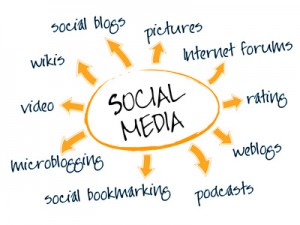 Tumblr, Twitter, Facebook, Pinterest, YouTube, Google + and LinkedIn. The plethora of social networks is a place to share, schmooze and, increasingly, sell. Welcome to word-of-mouth advertising in the 21st century.
Tumblr, Twitter, Facebook, Pinterest, YouTube, Google + and LinkedIn. The plethora of social networks is a place to share, schmooze and, increasingly, sell. Welcome to word-of-mouth advertising in the 21st century.
In those seemingly long-ago days before social media, marketers were shackled by the physical constraints of their customers’ interactions with other potential customers in their own social circle. In the digital age, those word-of-mouth boundaries have largely been erased.
According to a report by eMarketer, an estimated 1.6 billion people worldwide will use social networks in 2013, a 16% increase over the previous year. The company projects the number of social network users to surpass 1.8 billion in 2014.
Businesses cannot afford to ignore the low-cost marketing capabilities of social media, whether it’s a brand-related Facebook page or a corporate Twitter feed.
Of the almost 4,000 marketers surveyed for the 2012 Social Media Marketing Industry Report, more than 80% said they consider social media an important part of their business. The No. 1 benefit of social media cited by respondents: additional business exposure.
Social media gives marketers a venue for sharing their brand story in a conversational style. Satisfied customers can write positive reviews, which can help build a brand’s reputation and credibility. Conversely, a speedy response to a negative review can demonstrate a company’s dedication to its customers – thus bolstering its public relations image.
Building Relationships with Customers
Customer service also is being revolutionized. A study by Nielsen found that 47% of social media users engage in “social care,” or customer service via social media, with more than 30% preferring social care over telephone contact.
“Customers choose when and where they voice their questions, issues and complaints, blurring the line between marketing and customer service,” noted the authors of Nielsen’s Social Media Report 2012.
This online interfacing is an opportunity for marketers to strengthen ties with their customers and better understand their preferences. For example, the Nielsen study also found that one-third of social media users are more annoyed by ads on social networking sites than they are by other types of online ads. However, 26% said they are more likely to pay attention to an ad that was shared by a social media friend.
In order to be most effective, social media should be part of an integrated marketing campaign that preaches a consistent message across multiple channels. For example, when Target opened a new store in New York City in 2010 it purchased a wraparound ad on a subway train, used PR to secure a front-page story and focused on social media to promote the grand opening.
Social media also is a growing factor in a company’s ability to secure a high ranking for its website on search engines. Google, Bing and other search engines are using “likes,” “shares” and other social signals in their determination of a web page’s relative value. That’s a vital consideration for businesses since a higher ranking on a search engine means more online visitors – and, potentially, more sales.
Of course, the benefits of a social media strategy can’t be gauged simply in dollars and website traffic. Brand awareness and customer satisfaction may be less tangible measures, but they are no less important to a company’s long-term health.
Social media gives marketers a powerful new tool. With a solid strategy, it can be help a company establish its brand personality and build relationships with existing and prospective customers.






No Comment